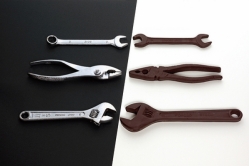Your hands will get really dirty!
Coordinating a project or cooperative networks doesn't mean using tools only. While useful, not only networking but also computerised tools have been described on tool-box cards showing their strong and weak points when setting a collaborative framework. They also suggest tutorials help when getting our hands dirty fully involved in a project.
Short training session (STS)
Short training session (STS)

Tools for conviviality
Card's author :
Laurent Marseault
Card's type of licence :
Creative Commons BY-SA
Description :
But which tool to use ? Which is the ideal tool ? Do you have models of specifications for perfect collaborative tools ?
I am often asked these questions.
It appears that the notion of collaborative tools helps us a little bit more over the essential question of the tool.
This notion is proposed by Ivan Illich, philosopher of ecological politics. For him, tools (understood in a broad sense, including technical means, institutions) alienate individuals and deprive them of autonomy. Their generalized use maybe heading to counterproductivity.
These three conditions applied to corporations and to technical means restore the place of individuals, allowing them to be actors in systems on which they have set on. Humans need that, humanity needs that.
N.B.: free tools are not necessarily for conviviality
Credits : outils en chocolat JanneM on Flickr - CC-BY-SA
I am often asked these questions.
It appears that the notion of collaborative tools helps us a little bit more over the essential question of the tool.
This notion is proposed by Ivan Illich, philosopher of ecological politics. For him, tools (understood in a broad sense, including technical means, institutions) alienate individuals and deprive them of autonomy. Their generalized use maybe heading to counterproductivity.
3 conditions for tools for conviviality
Illich proposes clear and simple specifications for what he calls tools for conviviality:- it must generate efficiency without damaging personal autonomy
- it must not arouse slaves nor masters
- it must widen the personal range
These three conditions applied to corporations and to technical means restore the place of individuals, allowing them to be actors in systems on which they have set on. Humans need that, humanity needs that.
The stressful library
In a library of the South of France, employees have today a « thin client » as workstation. It's a computer terminal connected to a server centre. Every night, the computer is done up as new, only personal files are saved. Any software settled by users (when it is possible), any customizations are deleted during the night. This system said to be very efficient by the IT services is considered as unbearable by librarians, generating a tangible psychic sufferings. Attempts of evolution towards more conviviality have been systematically rejected causing the withdrawal of those who were improving their Institution for the users' good.The map that gives ideas
Freeplane is a small software of mindmapping or heuristic mapping. Used with groups to help them summarizing the richness of their exchanges, it allows to make ideas and their complements visible. Rather systematically it gives desires and ideas to people who have used it. It's a freeware easy to handle, and to divert for new uses. It's the archetypal tool for conviviality.Cooperation, networks and conviviality
A network, a group which cooperates, joins a process that will need to equip itself and to improve its tools according to the stages of its process. Keeping in mind the conditions needed by tools for conviviality when elaborating organizations and the tools for their management will enable the elaboration of a living, evoluting and learning system. The network, cooperative or collaborative group will become places of learning, of innovations and liberations.N.B.: free tools are not necessarily for conviviality
To go further:
- Outil convivial. Wikipédia [online]. [Accessed 3 February 2014]. Available from: http://fr.wikipedia.org/wiki/Outil_convivial
- ILLICH, Ivan. La convivialité [online]. Paris : Éd. du Seuil, 1990. [Accessed 9 May 2012]. Points (Paris), ISSN 0768-0481 ; 65 Points. Civilisation. ISBN 2-02-004259-2. Available from: http://www.sudoc.fr/011301473
Credits : outils en chocolat JanneM on Flickr - CC-BY-SA
Comment faire ?
-
What tools and for what purpose? (depending on the network's evolution)
-
Which tools and for what purposes ? (depending on the type of group)
Comprendre...
Outils informatiques
- Blogger
- Diigo
- Dropbox
- Etherpad
- Evernote
- Framadate
- Freeplane
- Google calendar
- Google Documents (Google Drive)
- Google Forms
- Netvibes
- Pearltrees
- Prezi
- Scoop it
- Skype
- SPIP
- YesWiki
